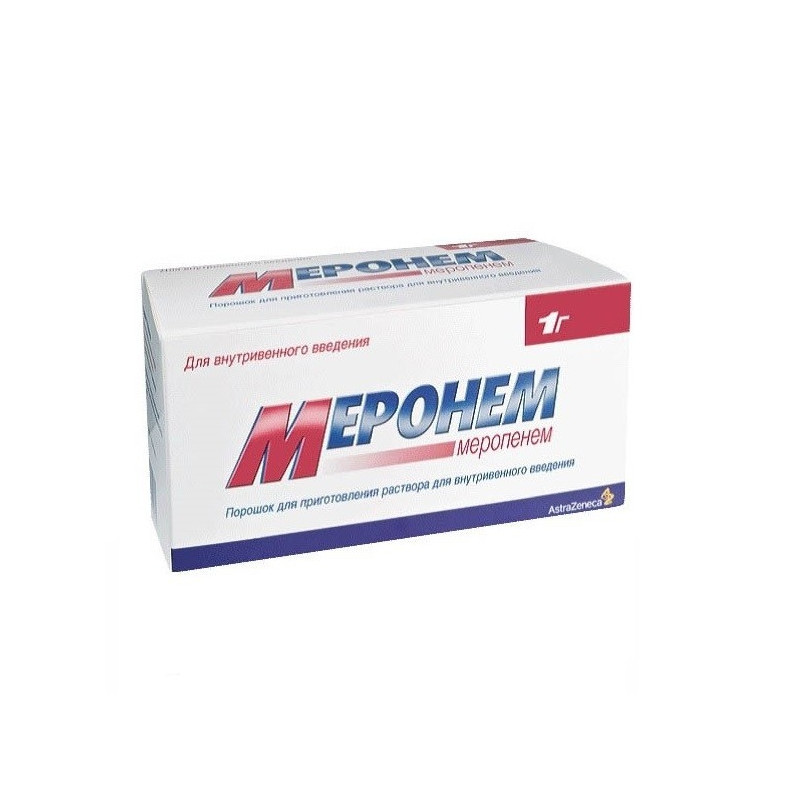



 All payments are encrypted via SSL
All payments are encrypted via SSL
 Full Refund if you haven't received your order
Full Refund if you haven't received your order
Meronem has an antibacterial effect.
Bacterial infections caused by susceptible pathogens (as monotherapy or combination with other antiviral and antifungal drugs): infections of the lower respiratory tract (including pneumonia, including nosocomial infections; infections caused by Pseudomonas bacilli), abdominal infections (complicated appendicitis, peritonitis, pelvioperitonitis), pyelonephritis, pyelitis, infections of the skin and soft tissues (including erysipelas, impetigo, secondarily infected dermatosis), dysentery, endocarditis, bacterial meningitis, sepsis, inflammatory diseases ANTONOV pelvic organs (including endometritis), suspected bacterial infection in adults with febrile episodes of neutropenia (empirical treatment). Bacterial infections caused by susceptible pathogens (as monotherapy or combination with other antiviral and antifungal drugs): infections of the lower respiratory tract (including pneumonia, including nosocomial infections; infections caused by Pseudomonas bacilli), abdominal infections (complicated appendicitis, peritonitis, pelvioperitonit), pyelonephritis, pyelitis, infections of the skin and soft tissues (includingerysipelas, impetigo, secondarily infected dermatoses), dysentery, endocarditis, bacterial meningitis, sepsis, pelvic inflammatory diseases (including endometritis), suspected bacterial infection in adults with febrile episodes on the background of neutropenia (empirical treatment).
Hypersensitivity, pregnancy, lactation, child age (under 3 months).
On the part of the digestive system: pain in the epigastric region, nausea, vomiting, diarrhea, cholestatic hepatitis, hyperbilirubinemia, increased activity of “liver” transaminases and alkaline phosphatase, LDH, rarely - oral candidiasis, pseudomembranous enterocolitis. On the part of the cardiovascular system: the development or worsening of heart failure, cardiac arrest, tachy- or bradycardia, decrease or increase in blood pressure, fainting, myocardial infarction, thromboembolism of the branches of the pulmonary artery. On the part of the urinary system: dysuria, edema, impaired renal function (hypercreatininemia, increased concentration of urea in the plasma), hematuria. Allergic reactions: skin itching, skin rash, urticaria, erythema multiforme exudative, angioedema, anaphylactic shock. Nervous system disorders: headache, paresthesias, insomnia, irritability, anxiety, depression, impaired consciousness, hallucinations, epileptiform seizures, convulsions. On the part of laboratory parameters: eosinophilia, neutropenia, leukopenia, rarely - agranulocytosis, reversible thrombocytopenia, reduced partial thromboplastin time.Local reactions: inflammation, thrombophlebitis, pain at the injection site; tissue damage with a concomitant rise in CPK (for intramuscular injection). Other: positive direct or indirect Coombs test, anemia, dyspnea, vaginal candidiasis.
Patients with a history of hypersensitivity to carbapenems, penicillins or other beta-lactam antibiotics may be hypersensitive to Meropenem. Treatment of patients with liver diseases should be carried out under the careful control of the activity of liver transaminases and bilirubin concentrations. In the course of treatment, the development of pathogen resistance is possible, and therefore long-term treatment is carried out under the constant control of the spread of resistant strains. In individuals with complaints of the gastrointestinal tract, especially those suffering from colitis, it is necessary to take into account the possibility of developing pseudomembranous colitis (the toxin produced by Clostridium difficile is one of the main causes of antibiotic-related colitis), the first symptom of which is diarrhea during treatment. When monotherapy is known or suspected infection of the lower respiratory tract severe, caused by Pseudomonas aeruginosa, it is recommended to regularly determine the sensitivity of the pathogen. During pregnancy and lactation, it is necessary to evaluate the potential advantage and the possible risk from the use of the drug for the fetus, infant and mother.
Incompatible with Heparin.Compatible with 0.9% NaCl solution, 5-10% dextrose solution, with 0.02% sodium bicarbonate solution, 5% dextrose solution with 0.225% NaCl, 5% dextrose solution with 0.15% KCl, 2.5 and 10% mannitol solution. Ganciclovir increases the risk of developing generalized seizures. Shows antagonism when interacting with beta-lactam antibiotics. Drugs blocking tubular secretion, slow down the excretion and increase the concentration in plasma.
Accidental overdose is possible during treatment, especially in patients with impaired renal function.
Treatment: symptomatic. Normally, the drug is rapidly eliminated through the kidneys. In patients with impaired renal function, hemodialysis effectively removes meropenem and its metabolite.
At a temperature not higher than 30 ° C.
